As temperatures rise, a functioning air conditioning unit becomes essential for comfort. However, there are times when your AC unit may not perform optimally, indicating the need for urgent repair. Understanding the signs that point towards emergency AC repair can help prevent discomfort and additional costs. This article outlines the key signals that suggest it’s time to call a professional.
1. Why Is My Air Conditioner Blowing Warm Air?
a. Common Causes of Warm Air Output
One common reason for an air conditioning unit to blow warm air is a malfunctioning thermostat. If the thermostat isn’t set correctly or is damaged, it can disrupt the AC unit’s ability to cool the air efficiently. Another cause could be a blocked or dirty air filter, which restricts airflow and causes the system to overheat. Regular maintenance of your AC unit can help avoid such issues by ensuring that all components are working properly.
b. Immediate Steps to Take Before Calling a Technician
Before contacting a technician, check whether your thermostat is set to the correct temperature setting. Switching it to ‘cool’ mode instead of ‘fan’ can make a significant difference. Additionally, inspect your air filters for any blockages or accumulated dirt and clean or replace them if necessary.
Another preliminary step is to ensure that no circuit breakers have tripped, cutting off power to your AC unit. This simple reset might resolve the issue without requiring professional intervention.
2. What Are the Strange Noises Coming from My AC Unit?
a. Types of Noises and Their Implications
Unusual noises, such as banging, squealing, or rattling, can indicate various potential problems within your AC unit. Banging noises often suggest loose or broken parts within the compressor, which can lead to system failure if not addressed. Squealing sounds might point to a worn-out belt or motor bearings that require lubrication or replacement.
On the other hand, rattling noises could signify debris trapped in the AC system or loose screws. Such noises are not merely a nuisance; they can indicate underlying issues that need immediate attention to prevent further damage.
b. How to Address Noise Issues Promptly
To address strange noises from your AC unit, start by turning off the system to avoid further damage. Inspect accessible components for any visible issues, such as loose parts or debris. Regular maintenance by a professional can help prevent many noise-related problems by ensuring that all components are secure and clean.
If noises persist, it’s a clear sign that you should contact a professional technician for a detailed inspection. Early intervention can save you money on extensive repairs and extend the lifespan of your AC unit.
3. Why Has My AC Unit Stopped Working Suddenly?
a. Identifying Electrical Issues and Safety Precautions
Sudden stoppage of an AC unit often stems from electrical issues such as blown fuses or tripped circuit breakers. These can compromise the power supply to your unit and need timely resolution. Before investigating the issue, ensure your safety by turning off the power to the AC unit at the breaker box.
In some cases, wiring problems or a faulty thermostat can lead to operational failures. Engaging a professional is crucial for safely identifying and fixing electrical problems to avoid hazards.
b. Ensuring Adequate Power Supply
Sometimes, an inadequate power supply can cause your AC unit to malfunction. Ensure that the power cord is securely plugged and that the outlet is functioning correctly. A reliable power source is essential for sustaining the operational efficiency of your AC unit.
Understanding your home’s electrical capacity can help you distribute power usage more effectively. Consulting an electrician to assess your home’s power supply might prevent future disruptions.
4. What Should I Do If My AC Produces Unpleasant Odors?
a. Determining the Source of the Odor
If your AC unit emits unpleasant odors, it could be a sign of mold growth or burnt wiring. Musty smells usually indicate mold or mildew, which can affect air quality and exacerbate allergies. On the other hand, a burning smell suggests electrical issues, possibly due to overheating components.
Identifying the source of the odor is crucial in determining the necessary course of action. A professional inspection can help accurately diagnose and rectify the problem.
b. Steps to Eliminate Odors and Prevent Recurrence
To eliminate odors, ensure that your air filters are clean and replace them regularly to prevent mold growth. Additionally, clearing the AC drain line and keeping the unit dry can help inhibit mold development. For cases of suspected electrical problems, it’s imperative to have an HVAC technician assess and rectify the issue sooner rather than later.
Implementing a routine maintenance schedule can help detect potential odor sources and address them proactively. Regular check-ups can also prolong your AC unit’s life and enhance your indoor air quality.
5. How Do I Know If My Air Conditioner Is Leaking Refrigerant?
a. Spotting Refrigerant Leaks Early
Refrigerant leaks in an AC unit often manifest as diminished cooling performance and longer cooling cycles. Another telltale sign is when ice forms on the evaporator coils due to the decreased pressure from low refrigerant levels. Addressing refrigerant issues promptly is vital to prevent further complications.
The absence of refrigerant can cause the AC compressor to overheat and fail, potentially leading to a system breakdown. Therefore, recognizing these early warning signs can save you from more significant and costly repairs down the line.
b. Long-term Effects of Refrigerant Issues
If left unchecked, refrigerant leaks can cause irreversible damage to the compressor, one of the most expensive components of an AC system. Moreover, inadequate refrigerant levels can increase energy consumption as the system struggles to maintain desired cooling temperatures. Regular inspections can detect leaks early and mitigate long-term effects.
Professional technicians can assess and repair leaks and recharge refrigerant levels as necessary to restore optimal functionality. Prioritizing timely repairs can also help maintain energy efficiency and reduce utility costs.



